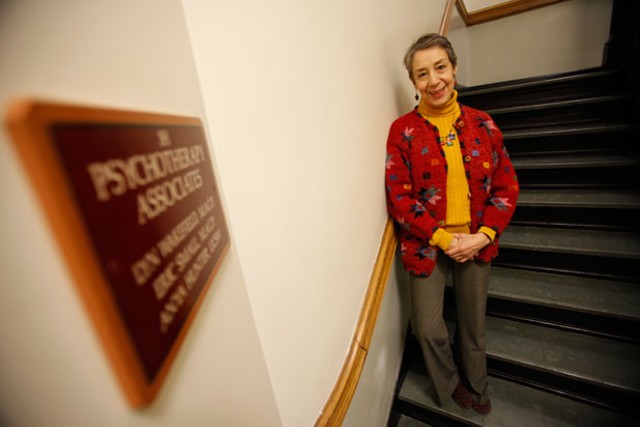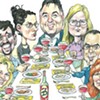Published January 19, 2011 at 8:05 a.m.
Put down that cookie. Or don’t. Just consider the consequences of taking another bite. Will the sugar and wheat make you feel logy? If you eat one, are cookies two and three sure to follow?
If you know you can stop, go ahead and indulge. But falling into a cycle of overeating is all too common, says Anya Raven Hunter. The clinical licensed social worker has built a whole practice around teaching food addicts and compulsive eaters to live one day — and one cookie — at a time.
Tucked away in an office accessible only from the back stairwell of the Richardson Place building on Burlington’s Church Street, Hunter’s practice, called Eating With Grace, will turn six this Valentine’s Day. A practicing psychotherapist since 1990, Hunter says she too often came across patients with unhealthy eating habits that originated far deeper than the stomach. Since her first Eating With Grace group session, the practice has grown to include ongoing groups, individual counseling and even Skype sessions.
Hunter lives her principles. Each day, she gets up and makes herself lunch as if she were preparing it for a child going to school. While it would be easy to grab fast food, she says, she’s learned to expect a hangover from the fat. Avoiding temptation brings its own reward and is part of staying “in harmony with how this body needs to eat today.”
Overeating is an obvious problem, but is food something we can be “addicted” to? An admitted carb and sugar craver, Hunter believes we can, and that the Food and Drug Administration should be taken to task for allowing food “as addictive as cigarettes” to be sold without warning labels. She points to the evidence put forth in former FDA head David A. Kessler’s 2009 tome The End of Overeating: Taking Control of the Insatiable American Appetite, which argues that the packaged food we love is biochemically engineered to be optimally palatable — perhaps addictively so.
This theory is still controversial, notes Jean Harvey-Berino, chair of the Department of Nutrition and Food Sciences at the University of Vermont, who hosted a talk by Kessler last year. “His premise is that you can be a food addict,” Harvey-Berino says. “I don’t think there is a lot of agreement in the scientific community about this stuff.”
Hunter, however, is convinced. She uses Morton salt as an example, pointing out that just behind sodium on the ingredient list lies a surprise: dextrose. “Isn’t that a crime?” she asks, raising her voice. “It’s layered in. All that stuff has sugar and creates cravings, and you can’t stop.”
Finding one’s own healthy way of eating is the core of Eating With Grace. The program is not a diet. As Hunter describes it, her groups and individual sessions are intended to teach patients to love and care for themselves. “As we grow up, we become the Mom of our own body,” she explains. “We’re the one who becomes in charge of all the things that our parents used to be — getting dressed, being where we need to, getting enough rest...” And eating responsibly.
This is especially difficult, says Hunter, because “when we’re newborns, food and Mom are the same thing.” Since, for most of us, food was our first relationship, many of us fall back on it in times of strife — or celebration. When Eating With Grace clients enroll in a group, Hunter believes, the relationships they build are part of the cure. She keeps the groups the same gender for optimal openness and comfort — right now, only female groups are offered.
Over each 12- to 16-week course, five to nine Eating With Grace participants gather weekly to discuss their progress. Hunter gives each woman a copy of The Don’t Diet, Live-It! Workbook: Healing Food, Weight & Body Issues, by Andrea Wachter and Marsea Marcus, a pair of California-based family therapists. Each week, the group is expected to complete one or two chapters, which cover topics such as emotional versus physical hunger and competition versus camaraderie. The book assigns its readers to write journal entries, do art therapy and answer probing questions; the steps are laid out in “journeys,” literalizing the concept of a voyage of self-discovery.
Hunter adds her own touches. She advises patients faced with food choices to stay mindful by visualizing a stoplight. If the food is a trigger that may cause a binge, such as a favorite dessert, the light goes red. Yellow lights are for dishes that may not be dangerous but aren’t particularly healthy. Green lights signal the OK to enjoy nutritious meals. Unlike diets such as Weight Watchers, which assign colors to “safe” and “unsafe” foods, Hunter lets patients decide for themselves based on their experiences.
Before enrolling in a group, clients must undergo a one-hour individual psychotherapy session with Hunter; this weeds out patients who are in too much distress to benefit from Eating With Grace, she says. She refers those who suffer from other substance abuse or mental health issues, such as bipolar disorder, to a specialist, and sends patients with anorexia or bulimia to the Vermont Center for Yoga & Therapy, where a psychiatrist and nutritionist are on staff.
Right now, Hunter says, 5 to 10 percent of her patients are men. Getting enough male clients to fill a group is a future goal. “I think there’s a lot of stuff for men that’s underaddressed,” Hunter says. In fact, she posits that many women’s body issues are inspired by those of the men around them. “Men’s body- image issues play out in how they look at women and how they need the trophy wife to feel good about themselves,” she explains. “The body-image stuff for women trickles down to how you eat and how you take care of yourself.”
The gender gap is just one aspect of body image and food obsession that Hunter believes has not only a personal and cultural dimension but a political one. Many insurance companies do not cover treatment for eating problems — because such issues are stigmatized, she believes. Because Hunter is a licensed social worker, her treatments — except for email and Skype sessions — are covered. However, Hunter says she’s heard of too many anorexics dying because they couldn’t afford the level of care they needed.
Hunter can identify with patients who face dieting challenges because she was one of them, she says. “I was generally addicted to sugar and carbs as a kid,” says the trim, stylish 60-year-old. By high school, she was overweight, which, she says, sent her on a twisted course of yo-yo dieting and pills. “I was pretty abusive toward my own body,” she reflects.
After finding peace with meditation and yoga, Hunter began working with a naturopath who diagnosed her with adrenal issues and sensitivities to dairy, sugar and wheat — many of them brought on by her previous bad habits, Hunter believes.
Today, Hunter is greatly limited in what she can eat. She mentions the café at City Market and Stone Soup as favorite restaurants, because both can fulfill her needs for protein, cooked veggies and whole grains. But even such seemingly wholesome recommendations are not for everyone, she notes. “Stone Soup, with all those pastries and breads, could be really dangerous for someone.”
How does Eating With Grace differ from Overeaters Anonymous and other addiction-recovery-based groups? Like them, says Hunter, it is posited on building community and supportive relationships. “You may know the ‘Oh, fuck it!’ syndrome,” says Hunter, straight faced. “You’ve tried something, and you blow it and say, ‘What’s the use? [I] might as well eat the whole bag or the whole carton.’” Groups, she says, tend to buck up their members after such failures and prevent the offender from giving up on herself.
But beyond the belief that “we are all precious beings,” says Hunter, her method and OA’s diverge. For one thing, she leads her groups. “If the conversation is going somewhere off course, I just say, ‘Why don’t we steer over here?’” Some participants in OA say the absence of a leader can foster an orgy of food fantasy. Bill Schubart, a local community leader who recently wrote about his struggles with food in Fat People, says of his experiences in OA, “Halfway through the meeting, I’m totally famished.”
Part of what qualifies Hunter to lead is her expertise as a mind-body therapist. She can guide members in negotiating both their emotional challenges and their biochemistry, often referring them to naturopaths to help their bodies start fresh.
Today Hunter says that, after years of struggle, “I’m pretty peaceful around food.” Food is to be enjoyed, she acknowledges, and she celebrates that eating has cultural functions beyond physical nourishment. However, she cautions, “If food is used for comfort or some kind of medicine emotionally, without mindfulness, bad things happen to good people.”
Listen to your cravings, Hunter advises, because they mean something: Yearning for a steak may indicate an iron deficiency. It’s just a matter of knowing the difference between wanting and needing.
“That pie may be renting all the space in your head,” says Hunter. “When that happens, you may not need me, but you need somebody to talk to.”
More By This Author
About the Artist

Matthew Thorsen
Bio:
Matthew Thorsen was a photographer for Seven Days 1995-2018. Read all about his life and work here.
Matthew Thorsen was a photographer for Seven Days 1995-2018. Read all about his life and work here.
Speaking of...
-

Q&A: Howard Fisher Delivers Meals on Wheels With a Side of Good Cheer
Dec 20, 2023 -

Video: Howard Fisher Delivers Meals on Wheels
Dec 14, 2023 -

'We Must Act Now': Burlington Council Passes Resolution on Drug Crisis, Public Safety
Oct 11, 2023 -

Q&A: Alexis Dexter Rescued 57 Shelter Cats During the July Flood
Sep 13, 2023 -

Video: Two Months After the Flood, Alexis Dexter Rebuilds Kitty Korner Café in Barre and Continues to Rescue Cats
Sep 7, 2023 - More »
Comments
Comments are closed.
From 2014-2020, Seven Days allowed readers to comment on all stories posted on our website. While we've appreciated the suggestions and insights, right now Seven Days is prioritizing our core mission — producing high-quality, responsible local journalism — over moderating online debates between readers.
To criticize, correct or praise our reporting, please send us a letter to the editor or send us a tip. We’ll check it out and report the results.
Online comments may return when we have better tech tools for managing them. Thanks for reading.















































